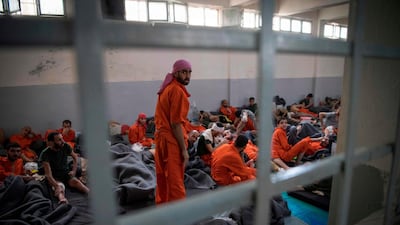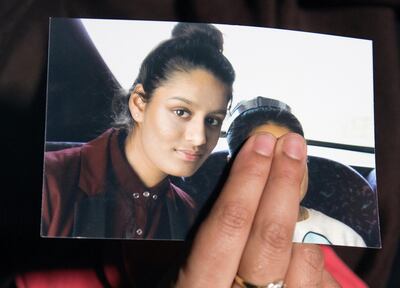Western policy in the Middle East is often maddening. It is at times amoral, failing to adhere to the standards that liberal democracies set for themselves. It is inconsistent, finding cause to invade where none exist, then shirking its responsibility to protect when the need is dire and mass slaughter is at hand.
It can also be cowardly, as amply demonstrated by the case of the ISIS foreign fighters still alive and imprisoned in Syria.
Western policy in Syria provides ample ground for frustration and disappointment, but among its most rage-inducing aspects is the failure to take responsibility for and pick up its own trash – the radical extremists who were born in and left London, Paris, Berlin, Oslo, Brussels, Copenhagen and North America to live out their nihilistic fantasies over the graves of the traumatised peoples of the Middle East in Syria and Iraq.
The latest analysis by the British government estimates that 30 Britons are among some 2,000 ISIS foreign fighters still detained in north-eastern Syria by Kurdish militias – the forces that fought alongside the US and liberated much of that part of Syria, including the terrorists’ self-proclaimed capital in Raqqa. Many of these men and women are being held indefinitely by the Kurds, who have been begging the international community to repatriate their detained citizens and deal with them in their national courts.
These detainees are the remnants of the terrorist army that swept through eastern Syria and northern Iraq, leaving the ruins of nation states in their wake. They helped destroy the dream of millions of Syrians who bravely marched against totalitarianism to live with dignity. They massacred Iraqis, exiled Christians, destroyed monuments of culture, and imposed their own brand of fascism. They had once numbered in the tens of thousands and have now been militarily defeated.
Many of these fighters who made their way to Syria from Europe via Turkey did so under the nose of European security services, who either did not have the resources to monitor terror suspects adequately, failed to share intelligence properly, or simply allowed these fighters to leave the EU hoping they would die fighting for the false caliphate. Some arrived in Turkey with equipment like gun parts and night vision goggles, items that apparently did not garner interest from European airport authorities.
Some who were deported by Turkey due to suspicions that they were part of foreign fighter networks returned home to carry out terrorist attacks, despite Ankara issuing warnings to their European counterparts. One example is Ibrahim Al Bakraoui, one of the suicide bombers who attacked Brussels airport in 2016, as well as Ismael Omar Mostefai, who took part in the 2015 Paris attacks. The detainees remain an active and potential threat to international security.
Turkey itself had turned a blind eye to radicals who arrived from all over the world hoping to join the battle in Syria, until it began tightening its own border crossings after a spate of suicide bombings in the country.
Having permitted their flight, now European powers are bending over backwards to shirk their responsibility. Some of their homegrown radicals have been left to face hastily arranged tribunals in Iraq where death sentences are handed out with alacrity. Many are in Kurdish custody and may soon revert to the custody of the Syrian regime of Bashar Al Assad. Some have had their nationalities stripped under newly enacted counterterrorism laws, such as Briton Shamima Begum, who joined ISIS when she was 15. Her newborn died in a refugee camp soon afterwards.
It is self-evident that western countries ought to take responsibility for repatriating and putting on trial their own citizens who imparted so much torment towards Syrians and Iraqis. It is simply the right thing to do and there is no excuse for the petulant attitude that pretends they are someone else’s problem now. “Not it!” they seem to be shouting.
This reality applies irrespective of all the reasons western capitals have drummed up to justify shirking their responsibility. For instance, they argue that the challenges of gathering evidence from war zones and limits on jurisdiction mean that ISIS returnees cannot be suitably prosecuted, and risk going free in a few years to carry out attacks.
This is simply cover for political posturing because no party wants to be held responsible for repatriating terrorists. It is moral cowardice. And, at any rate, it should not be the problem of Syrians and Iraqis.
But there are good practical reasons for doing the right thing as well. A strong framework for prosecuting young men and women traveling to fight in foreign conflicts that grapples with how to re-integrate into society can act as a deterrent against future foreign fighters and address a real and present danger instead of burying one's head in the sand. Leaving their fate to the latest swing in momentum in the Syrian civil war is a recipe for disaster, as the combating sides use ISIS extremists as bargaining chips, or find themselves unable to hold them any longer (reports have emerged of prison breaks in the Kurdish camps after the launch of the recent Turkish invasion in northeastern Syria).
As the Kurds seek reconciliation with the Assad regime to fend off Turkish aggression, ISIS fighters will become bargaining chips held by the Syrian government, which has used terrorists to its advantage in Iraq and elsewhere in the Middle East and actively encouraged the formation of radical militias inside Syria itself by releasing known extremists from jail in the early months of the uprising, hoping to present a stark choice to the international community between Al Assad and terror groups.
Finally, the absence of a framework for prosecution and monitoring risks allowing these fighters to slip through the cracks – released after trials in neighboring countries, in prisoner exchanges, or old-fashioned escapes, with the aim of reestablishing their terror cells one day as systemic roots of revolts remain unresolved, and violence continues.
Languishing in Syrian prisons, the West’s foreign fighters may one day come back to haunt their homelands. Their countries ought to do something about them, for their own sake, as well as the sake of Syrians and Iraqis.
Kareem Shaheen is a former Middle East correspondent, now in Canada



